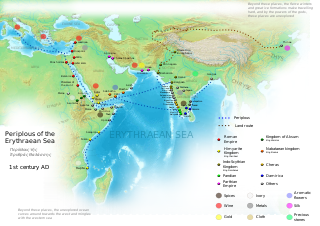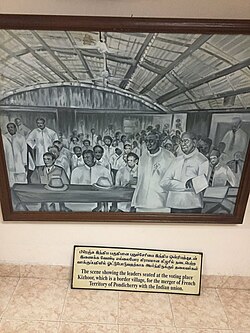
Puducherry, also known as Pondicherry, is a union territory of India, consisting of four small geographically unconnected districts. It was formed out of four territories of former French India, namely Pondichéry, Karikal (Karaikal), Mahé and Yanaon, excluding Chandannagar (Chandernagore), and it is named after the largest district, Puducherry, which was also the capital of French India. Historically known as Pondicherry, the territory changed its official name to Puducherry on 1 October 2006.

Yanam is a town located in the Yanam district in Puducherry. It has a population of 35,000 and is entirely surrounded by Andhra Pradesh. It was formerly a French colony for nearly 200 years, and, though united with India in 1954, is still sometimes known as "French Yanam". It possesses a blend of French culture and the Telugu culture, nicknamed Frelugu. During French rule, the Tuesday market at Yanam was popular among the Telugu people in the Madras Presidency, who visited Yanam to buy foreign and smuggled goods during Yanam People's Festival held in January. After implementation of the Child Marriage Restraint Act, 1929 in British India, Telugu people often traveled to Yanam to conduct child marriages, which remained legal under the French administration.

Pondicherry is the capital and most populous city of the Union Territory of Puducherry in India. The city is in the Puducherry district on the southeast coast of India and is surrounded by the Bay of Bengal to the east and the state of Tamil Nadu, with which it shares most of its culture, heritage, and language.
Édouard Goubert was mayor and first chief minister of Pondicherry between 1 July 1963 and 11 September 1964. Initially a strongly pro-French leader, he later shifted towards the pro-merger Indian National Congress, which ultimately became the death knell for the sovereignty of France's comptoirs in India. He and Lambert Saravane founded the French India Socialist Party in July 1947.
Dadala Raphael Ramanayya was an Indian nationalist leader who was instrumental in the merger of the French territory of Yanam into the Republic of India.

The Puducherry Legislative Assembly is the unicameral legislature of the Indian union territory (UT) of Puducherry, which comprises four districts: Puducherry, Karaikal, Mahé and Yanam. Out of eight union territories of India, only three have legislatures and they are Delhi, Puducherry and Jammu and Kashmir. After delimitation shortly after its formation, the Puducherry legislative assembly has 33 seats, of which 5 are reserved for candidates from scheduled castes and 3 members are nominated by the Government of India. 30 out of 33 Members are elected directly by the people on the basis of universal adult franchise and the remaining three are nominated by the central government. These nominated members enjoy same powers as elected members of the assembly.
Though the French established colonies in India in the 17th century itself, it was not until the end of the 19th century they started civil administration in French India.
The Coup d'état of Yanaon (Yanam) was a tense but ultimately non-lethal political coup at Yanam, India, in 1954. It occurred as India and France held ongoing negotiations regarding the future of French settlements in India. Yanam, along with Pondicherry, Karikal, and Mahé, was one of four small French colonial enclaves remaining in India after its 1947 independence from Britain. Though widely separated along both of India's coasts, the towns were collectively known as Pondicherry, after the largest of the settlements.

The City of Puducherry on the southeast coast of India does not have a recorded history from antiquity. Puducherry has history recorded only after the advent of the colonial powers such as the Dutch, Portuguese, English and the French. Nearby places such as Arikanmedu, Kakayanthoppe, Villianur, and Bahur, which were annexed by the French East India Company over a period of time and became the Union Territory of Puducherry after Independence, have written histories that predate the colonial era.

Yanaon was one of the five principal settlements of French India between 1731 and 1954. It was referred to in British records as Yanam.
The municipalities of Puducherry include five administrative municipalities in the Union Territory of Puducherry, India. The territory had French system of municipal administration from 1880 through 1968, when it was reformed.
The Treaty establishing De Jure Cession of French Establishments in India was a treaty signed between France and India in 1956 that ceded French territories in India to the Republic of India.

Maurice Paquirissamypoullé, or Paquirissamy-Poullé, was a rice trader and politician from the colony of Karaikal in French India. He represented the colony in the Council of the Republic from 1947 until 1955, when his seat was dissolved following the union with India. He did what he could to ensure a peaceful transition of power.

After the de facto merger on 1 November 1954 and before the legal integration with the Indian Union on 16 August 1962, second general elections were held in August 1959 to constitute Second Pondicherry Representative Assembly.
In 1946, French India became Overseas territory of France. Then, in the same year on 25 October, the Representative Assembly of French India of 44 members has been created that replaced the general council of 30 members.

After the merger of French settlements into an Indian union, a new assembly, named the Pondicherry Representative Assembly, was created by the government of India. After the "de facto transfer day" of 1 October 1954, before 16 August 1962 also referred to as "de-jure transfer day". During this transition period, general elections to the representative assembly were held in 1955 and 1959. After the de-jure transfer day, legal integration of French settlements into the Indian Union was complete. However, this assembly, like its predecessor, was advisory in its role, which led to frequent contention between the popular government and the chief commissioner.

After the de facto merger on 1 November 1954 and before the legal integration with the Indian Union on 16 August 1962, general elections were held in 1955 and 1959. In January 1955, The Indian union government renamed the French settlements in India as State of Pondicherry by passing an order. The previous assembly that was elected during French rule was dissolved on 13 June 1955 and the first general elections to the Pondicherry Representative Assembly were held in next month from 18 to 23 July for 39 constituencies. The election were held on the basis of adult franchise under the State of Pondicherry Order, 1955 which prescribed the rules and regulations for the conduct of elections, more or less on the pattern adopted in the Indian Union.













